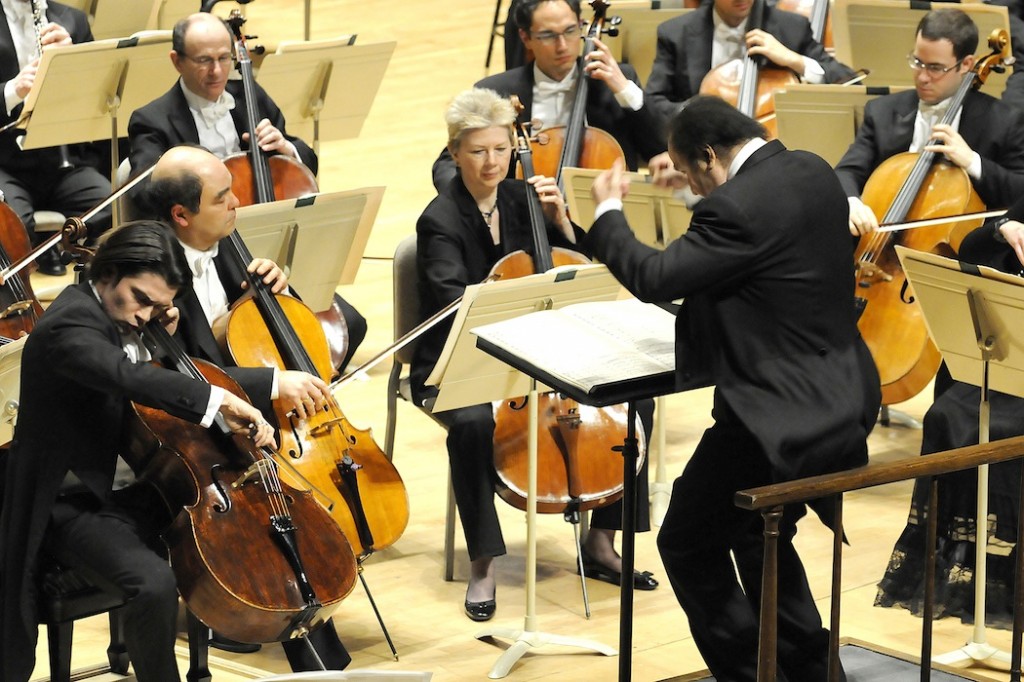Capuçon’s memorable debut highlights the BSO’s French-accented program

Cellist Gautier Capuçon performs Dutilleux's "Tout un monde lointain..." Thursday night with Charles Dutoit leading the BSO. Photo: Stu Rosner
In some ballgames, the famous stars are outshone by players down the lineup. In some orchestral concerts, the likes of Richard Strauss and Claude Debussy have to take a back seat to…Henri Dutilleux.
A master of orchestral color and expression, Dutilleux—who turned 96 on January 22—is hardly a celebrity with most concertgoers. No matter—his Tout un monde lointain… for cello and orchestra, rendered Thursday by the Boston Symphony Orchestra under Charles Dutoit with the superb cellist Gautier Capuçon, earned the biggest ovation of the night. Hampered by un-idiomatic performances, Strauss’s Le Bourgeois Gentilhomme Suite and Debussy’s La Mer could only look on in envy.
To be fair, the Strauss piece is the product of such a jumble of impulses and influences—Molière’s satirical play, elegant music composed for it 300-plus years ago by Jean-Baptiste Lully, the stage director Max Reinhardt, Strauss’s poet-collaborator Hugo von Hofmannsthal, an opera-within-the-play (which later became Ariadne auf Naxos), and Strauss’s own inclination to both elegance and buffoonery—that a coherent interpretation of it is a tall order indeed.
Still, one should at least expect the work’s small (by Strauss standards) orchestra to sound clear and vigorous, in the Baroque spirit. Dutoit’s performance Thursday fell short of that most of the time, stubbornly refusing to come into focus amid ragged ensemble and lax rhythms. Straussian moments of grace, high ardor, and low sentimentality slipped by unrealized; even the usually impeccable solo playing of concertmaster Malcolm Lowe ran into some flat high notes.
Eventually, the ensemble rallied to partially rescue the performance with a courante in intricate canons, a tender sarabande for strings playing non vibrato like a consort of viols, and a suitably pompous grand dinner scene for the play’s nouveau riche hero.
Still, with the opening of the Dutilleux work—a whisper on suspended cymbals, a pianissimo rising line for the solo cello—one sensed that the evening’s main event had arrived.
Composed in 1967-70 for Mstislav Rostropovich, Tout un monde lointain… (An Entire Distant World…) sprang, like the Strauss piece, from a problematical stage project, in this case a proposed ballet in honor of the poet Baudelaire’s centenary. Although dancing to the poet’s complex evocations of sensuality and ideal beauty proved impractical, the composer’s immersion in Baudelaire’s “distant world” found expression in purely musical terms. Rostropovich had requested a concerto in 1960; ten years later, he received a tone poem for cello and orchestra in five movements, each with an epigraph selected from Baudelaire’s poetry.
For the most part, Dutilleux uses the large orchestra sparingly, applying and mixing tone color in transparent layers, which Dutoit rendered exquisitely audible in the clear acoustics of Symphony Hall. The piece’s movements could be described as variations, slow movements, scherzo, and presto finale, but that wouldn’t do justice to Dutilleux’s endlessly mutable mood-painting; the first movement’s title, Énigme, could apply to them all.
The solo cello moves through this sound world with a subtlety worthy of the poet who inspired this music. Making a memorable debut with this orchestra, the French cellist Gautier Capuçon held the audience in thrall with a simple eloquence that made one forget the music’s considerable technical demands—although the sound of his perfectly-tuned double stops was a reminder of the approximate intonation we’ve learned to put up with from some other soloists.
Dutilleux is said to have admired Rostropovich’s playing in the cello’s upper register, and written this piece’s cello part accordingly. Capuçon also shone there Thursday night, with agility and a wonderful variety of tone and inflection—but one wouldn’t have minded hearing a few more of his room-filling low notes as well. The cellist’s tone never became harsh or grunty even in the most vigorous passages.
With this poetic vision still glowing in the mind (the intermission having already occurred between the Strauss and the Dutilleux), the audience settled back to savor that classic evocation of natural beauty in French music, La Mer. Unfortunately, Le Desert might have been a more appropriate title for the excessively bright, even strident, performance that followed, which seemed more driven by Dutoit’s baton than by elemental forces of nature. One longed to hear waves, not cellos, and sea breezes, not flutes—a situation not helped by the hall’s lucid acoustics. Better to put this dry ocean out of mind and return to the sensuous enigmas of Baudelaire and Dutilleux.
The program will be repeated 1:30 p.m. Friday and 8 p.m. Saturday. bso.org; 617-266-1492.
Posted in Performances